Gender DynamiX is a long-standing national and regional advocacy organization by and for trans people.
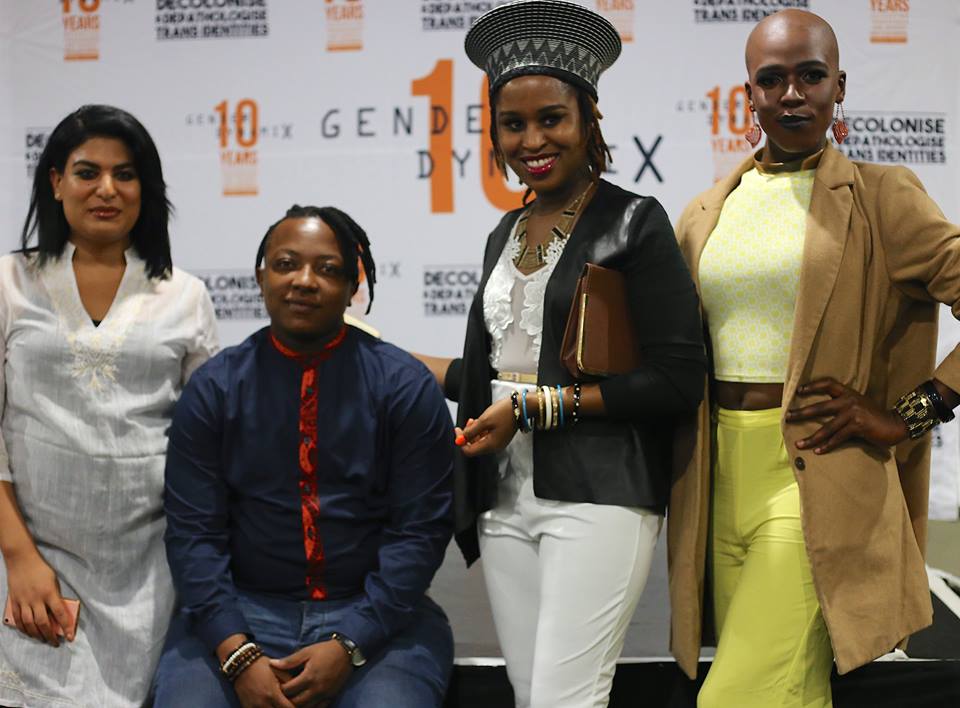
Gender DynamiX is a long-standing national and regional advocacy organization by and for trans people. Gender DynamiX’ long term goal is to ensure that diverse trans and intersex people are able to live openly, without obstruction, and in dignity by being able to equitably participate in the social, political and economic spheres of society. Over the last four years, they have engaged in advocacy campaigns to enforce Act 49 (the existing legal gender recognition law), increase access to healthcare, education, and accountability for violence against trans communities. They now have an opportunity to refocus efforts on redrafting South Africa’s gender recognition law to fully incorporate fundamental human rights for diverse trans people, which includes the right to self-identification premised on one’s right to self-determination, dignity and freedom. Over the next two years, they will build up a self-identification discourse, consolidate support amongst human rights movements, develop self-identification jurisprudence through test litigation cases and build a solid network of political and social stakeholders invested in legislative change.
Founded in 2004, Colombia Diversa works for the equal inclusion of LGBT people in Colombia through legal advocacy, documentation of human rights violations, advocacy on national and international public policies and visibility.
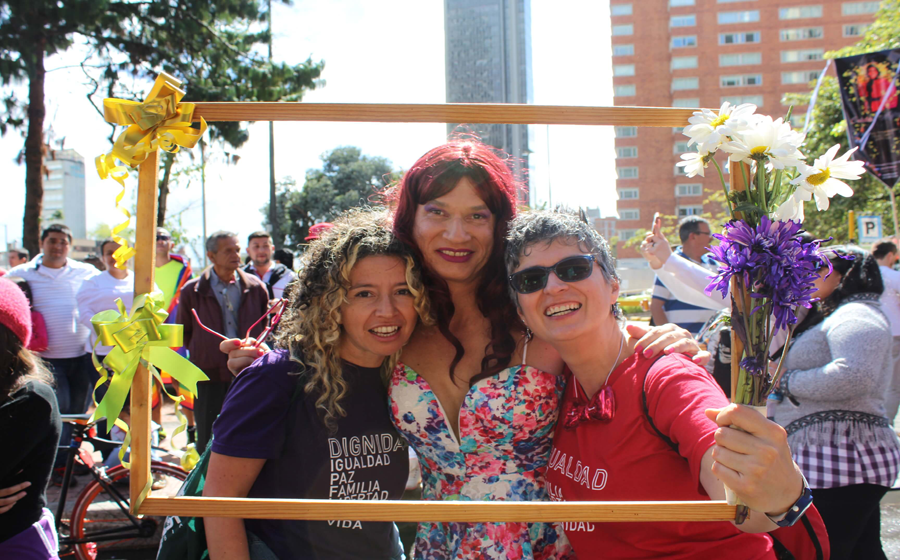
Founded in 2004, Colombia Diversa works for the equal inclusion of LGBT people in Colombia through legal advocacy, documentation of human rights violations, advocacy on national and international public policies and visibility. Colombia Diversa had a major victory in April 2016, when the Colombian Constitutional Court ruled in favor of marriage between same-sex couples. This victory represents more than 10 years of work in the long and difficult battle for the recognition of other rights of the same sex couples that lived in union, which was directed by Colombia Diversa and was supported by Astraea and five years of Direct work by marriage between same-sex couples. In 2011, the Constitutional Court stated that it gave Congress a period of two years to systematically regulate the rights of same-sex couples, if it did not, as of June 2013, couples could legally register their unions for Extend the matrimonial benefits received by heterosexual persons by then. Because this bill was never approved by Congress, as of 2013, activists in favor of same-sex marriage argued that because of the legal ambiguity of the Constitutional Court order, Sex could go to notaries or judges to get married. Colombia Diversa worked with progressive judges throughout the country, sometimes in secret, who were willing to marry same-sex couples. The conservative Attorney General of Colombia National prosecuted and prosecuted some of these couples and, in response, Colombia Diversa also filed suits on behalf of these couples. These lawsuits opened the legal path to bring back the case of equal marriage to the Constitutional Court that resulted in this recent victory. Colombia Diversa also visibly supported with legal arguments and social mobilization the different efforts that resulted in the complementary victory of the full adoption of rights for gay and lesbian couples in the Constitutional Court in November 2015.
*** En Español***
Fundada en 2004, Colombia Diversa trabaja por la inclusión igualitaria de las personas LGBT en Colombia a través de la defensoría legal, la documentación de los derechos humanos, la defensoría internacional y la visibilidad. Colombia Diversa tuvo una victoria importante en abril de 2016, cuando el Tribunal Constitucional colombiano falló a favor del matrimonio entre parejas del mismo sexo. Esta victoria representa más de 10 años de trabajo en la larga y difícil batalla por el reconocimiento de las relaciones de parejas del mismo sexo, la cual estuvo dirigida por Colombia Diversa y fue apoyada por Astraea, y de cinco años de trabajo directo por el matrimonio entre parejas del mismo sexo. En 2011, el Tribunal Constitucional ordenó que las parejas del mismo sexo podían registrar legalmente sus relaciones dentro de dos años en caso de que el Congreso no les extendiera los mismos beneficios matrimoniales que reciben las personas heterosexuales. Aunque este proyecto de ley no pasó en el Senado en 2013, lxs activistas a favor del matrimonio entre personas del mismo sexo argumentaron que, debido a la ambigüedad legal de la orden del Tribunal Constitucional, las parejas del mismo sexo podían acudir a notarios o a jueces para casarse. Colombia Diversa trabajó con jueces progresistas por todo el país, a veces en secreto, que estaban en disposición de casar a parejas del mismo sexo. El conservador Fiscal General de Colombia demandó a algunas de estas parejas y, en respuesta, Colombia Diversa también sometió demandas en nombre de estas parejas. Estas demandas legales abrieron el camino legal para traer de vuelta el caso al Tribunal Constitucional y, eventualmente, resultaron en esta reciente victoria. Colombia Diversa también encabezó los esfuerzos que resultaron en la victoria complementaria de la plena adopción de los derechos para las parejas gays y lesbianas en el Tribunal Constitucional en noviembre de 2015.
MAB trains and supports other organizations in feminist self-care and in artivism, offering each year a theater school in Bogotá and a community video trainings throughout South America.
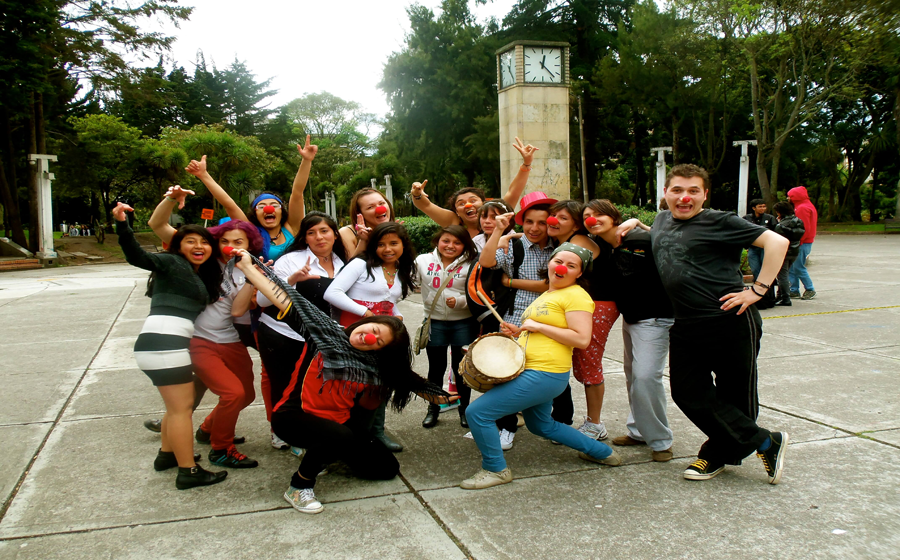
Mujeres al Borde (MAB) is a transfeminist collective founded in 2001 with the mission of raising visibility, fostering leadership, and creating networks of affection and creative work among sexually and gender dissident people, as well as promoting Recognition and respect for the rights of women and LGBTIQ communities. Its main strategies are Artivismo (Art + Activism), popular education, transfeminist methodologies and grassroots community work, creating links between the various movements with which they work. It was the first organization in Colombia to open spaces for people of bodies and multiple identities, thus contributing to the recognition and politicization of experiences that had remained poorly visible or that had been stigmatized by the LGBT community itself. At the regional level, their transfeminist practice has been expressed in important actions such as the co-creation of the “Come to the South” LesBiTransInter meeting, which challenged the idea that only women can be feminists and the initiative of the Southern Transfusion Network. MAB trains and supports other organizations in feminist self-care and in artivism, offering each year a theater school in Bogotá and a community video trainings throughout South America. *** En Español*** Mujeres al Borde (MAB) es una colectiva transfeminista que se fundó en el 2001, con la misión de elevar la visibilidad, fomentar el liderazgo, las redes de afecto y de trabajo creativo entre personas disidentes sexuales y del género, así como también promover el reconocimiento y respeto de los derechos de las mujeres y de las comunidades LGBTIQ. Sus estrategias principales son el Artivismo (Arte + Activismo), la educación popular, las metodologías transfeministas y el trabajo comunitario de base, creando lazos entre los diversos movimientos con los que trabajan. Fue la primera organización en Colombia en abrir espacios para personas de cuerpos e identidades múltiples, aportando así al reconocimiento y politización de experiencias que habían permanecido poco visibles o que habían sido estigmatizadas por la misma comunidad LGBT. A nivel regional su práctica transfeminista se ha expresado en acciones importantes como la co-creación del encuentro LesBiTransInter “Venir Al Sur” que retó la idea de que solo las mujeres cisgénero podían ser feministas y la iniciativa de la Red Transfeministas del Sur. MAB capacita y apoya a otras organizaciones en autocuidado feminista y en artivismo, ofreciendo cada año una escuela de teatro en Bogotá y una de video comunitario que itinera por América del Sur.
Grupo Safo was formed in 2004 with the aim of making lesbian and bisexual women in Nicaragua visible.
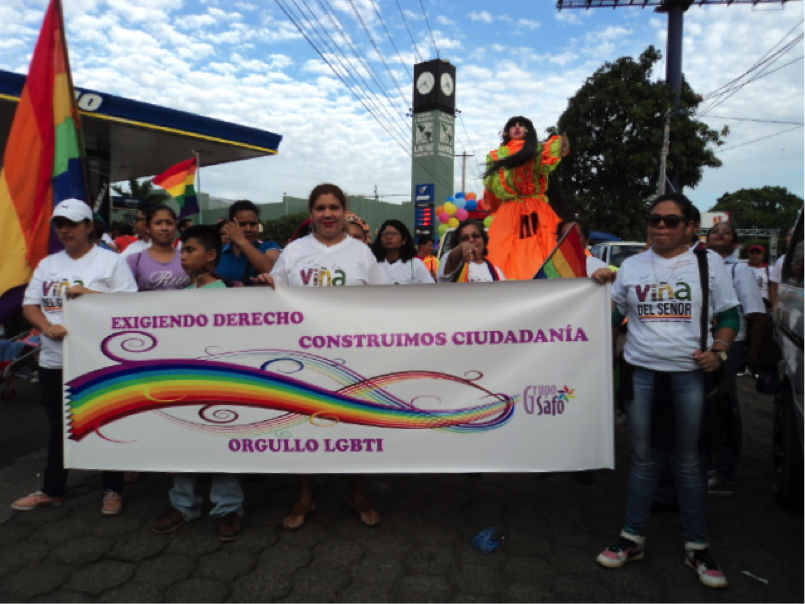
Grupo Safo is a group of lesbian and bisexual women who defend human rights and citizenship. Founded in 2004 with the aim of helping lesbian and bisexual women in Nicaragua achieve visibility, the organization has a presence in Managua and the West of the country. Grupo Safo promotes sexual and reproductive rights, lesbian sexual health and family rights. The areas of work include: psychological and legal support to lesbian mothers, sexual and reproductive health, advocacy and prevention of STIs/HIV. Grupo Safo aspires to be an organization of national and international reference that promotes broad political and educational impact on the defense of human rights and citizenship of lesbian and bisexual women and their families, and contributes to the empowerment of Nicaraguan lesbian identity. The organization contributes to and affects lesbians and bisexual women and entire LGBT community have more and better access to justice. Towards that, Safo Group provides legal and psychological support to lesbian and bisexual women who have suffered discrimination or incidents of physical, emotional and economic violence. Grupo Safo manages a Hate Crime Observatory to record cases of violence and discrimination against lesbian women; this documentation helps lesbians achieve legal visibility. Grupo Safo shows discrimination in its various manifestations and simultaneously initiates a process of awareness with key stakeholders. *** Grupo Safo es un grupo de mujeres lesbianas y bisexuales que defienden los derechos humanos y de ciudadanía; que se fundo en el 2004 con el objetivo de visibilizar y acompañar a las mujeres lesbianas y bisexuales de Nicaragua. La organización tienen presencia en Managua y el Occidente del país. Promueven los derechos sexuales y reproductivos, salud sexual lésbica y derechos de familia. Los ejes de trabajo incluyen: acompañamiento psicológico y jurídico a madres lesbianas, familiares de Lesbianas, salud sexual reproductiva, incidencia política y prevención de las ITS, VIH. Grupo Safo aspira a ser una organización de referencia nacional e internacional que promueve una amplia incidencia política y educativa en la defensa de los derechos humanos y de ciudadanía de las mujeres lesbianas y bisexuales y sus familiares, y que contribuya al empoderamiento de la identidad lésbica nicaragüense. La organización contribuye e incide para que las mujeres lesbianas y bisexuales, así como toda la comunidad LGBT tengan un mayor y mejor acceso a la justicia. Hacia eso, Grupo Safo aporta su acompañamiento legal y psicológico a mujeres lesbianas y bisexuales que han sufrido discriminación o incidentes de violencia física, emocional y económica. Grupo Safo administra un Observatorio de Crímenes de Odio para registrar casos de violencia y discriminación hacia las mujeres lesbianas. Mediante el registro se logra visibilizar y evidenciar la discriminación en sus diferentes manifestaciones y a la vez iniciar un proceso de sensibilización con actores claves.
allgo is a 31-year-old organization that works toward its vision of a just and equitable society that celebrates and nurtures vibrant people of color queer cultures.
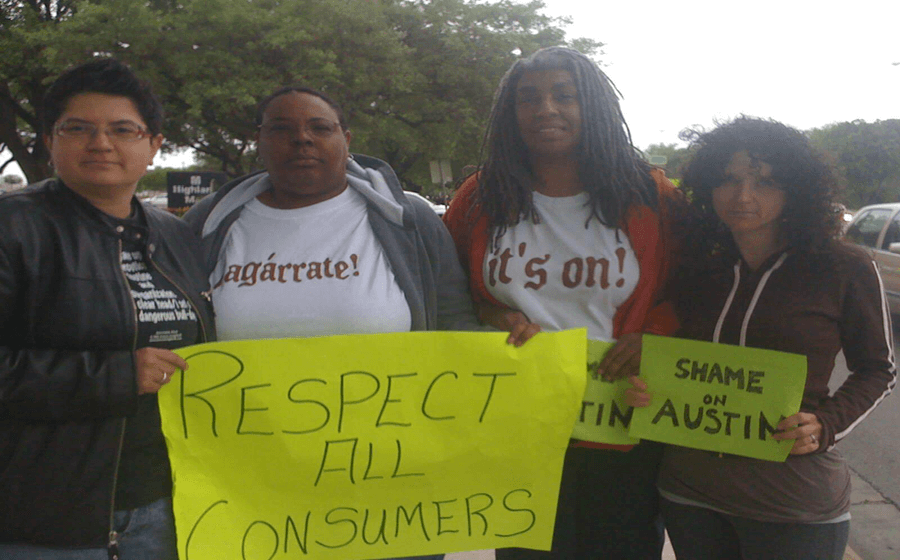
allgo is a 31-year-old organization that works toward its vision of a just and equitable society that celebrates and nurtures vibrant people of color queer cultures. To this end, allgo carries out cultural arts, health and advocacy programming. For example, they completed a project to uncover the needs of trans and queer youth in correctional facilities and conducted national and statewide trainings for youth correctional facilities staff on youth safety and protection from sexual violence. Additionally, allgo mobilized efforts for the release of the “San Antonio Four”, four Latina lesbians wrongfully convicted and imprisoned for more than 15 years due to racial and LGBTQ discrimination. allgo’s goals include holding a QPOC Activist Leadership Summit, carrying out local and statewide efforts on immigration and worker’s rights, and continuing the ongoing task of grassroots basebuilding. This organization is supported through the Funding Queerly Giving Circle, which is housed at Astraea.






